Jesus and the Pharisees have been in conflict for many studies. How long were they in conflict in real life? We do not know. Earlier Jesus had left Jerusalem (John 4:1-3) for two reasons: John the Baptist had been put into prison by King Herod and the Pharisees were concerned about His popularity. So Jesus left for Galilee and continued His ministry there. But the Pharisees followed, and sometime later Jesus found Himself in conflict with them once again. The Pharisees had accused Jesus of blasphemy (Matthew 9:1-8), associating with sinners and tax collectors (Matthew 9:9-13), refusing to fast on a day of fasting (Matthew 9:14-17), telling someone to work on the Sabbath (John 5:1-17), and of healing on the Sabbath. Repeatedly, the Pharisees had challenged Jesus, and repeatedly they were wrong. Jesus broke their rules and refused to submit to them. As a result, the Pharisees became outraged. In our last study, we left a group of raging, angry Pharisees who had started actively working with the Herodians to destroy Jesus. Now they want to murder Him.
Jesus Leaves
So Jesus left the area of His latest conflict because He knew that they were planning to murder Him. According to Matthew and Mark, Jesus had a large crowd following Him. It would have been easy to find Jesus.
The Pharisees went out and immediately began conspiring with the Herodians against Him, as to how they might destroy Him. Mark 3:6 (NASB)
But Jesus, aware of this, withdrew from there. Many followed Him . . . Matthew 12:15 (NASB)
Jesus withdrew to the sea with His disciples; and a great multitude from Galilee followed; and also from Judea, and from Jerusalem, and from Idumea, and beyond the Jordan, and the vicinity of Tyre and Sidon, a great number of people heard of all that He was doing and came to Him. Mark 3:7-8 (NASB)
Jesus went to the shore of the Sea of Galilee and people who had come from the north, south, east, and west followed Him. The crowd was extremely large, and it appears that Jesus stayed in one place while He healed many of them. Matthew reminds us of a prophecy related to Jesus’ massive ministry when he writes,
Many followed Him, and He healed them all, and warned them not to tell who He was. This was to fulfill what was spoken through Isaiah the prophet: “Behold, my servant whom I have chosen; My Beloved in whom my soul is well-pleased; I will put my spirit upon Him, and He shall proclaim justice to the Gentiles. He will not quarrel, nor cry out; nor will anyone hear his voice in the streets. A battered reed He will not break off, and a smoldering wick He will not put out, until He leads justice to victory. And in His name the Gentiles will hope.” Matthew 12:15-21 (NASB)
The prophecy predicted that “My Beloved” would be pleasing to God the Father. The Beloved was and is Jesus. Jesus was to be filled with the Holy Spirit during His ministry, and this has been true (Luke 3:22; 4;1; 4:18). He would not fight for Himself, and even the Gentiles would follow Him – a Jew. This was a remarkable prophecy. Both Jews and Gentiles would seek Jesus. The prophecy was correct.
According to Mark, so many people came that Jesus was crowded. They were trying to touch Him since even a touch could result in healing and relief from demonic possession. Imagine thousands of people trying to get to Jesus. The people were probably pushing and squeezing between one another in order to get to Him.
And He told His disciples that a boat should stand ready for Him because of the crowd, so that they would not crowd Him; for He had healed many, with the result that all those who had afflictions pressed around Him in order to touch Him. Whenever the unclean spirits saw Him, they would fall down before Him and shout, “You are the Son of God!” And He earnestly warned them not to tell who He was. Mark 3:9-12 (NASB)
Therefore, Jesus decided to escape. What a picture! A massive crowd of needy people following a divine Savior! A massive crowd trying to get to Him.
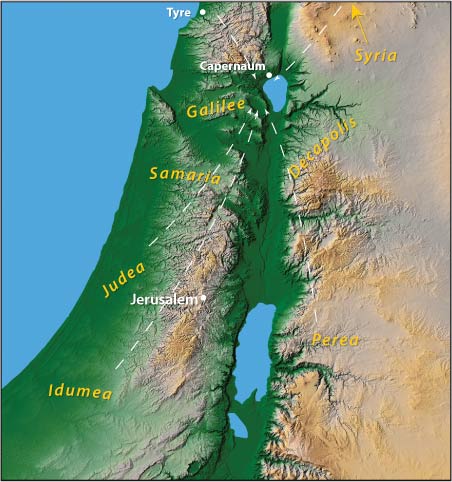
Night Of Prayer
The crowd believed in Him and so did His disciples. We do not know how many disciples were following Jesus at this time, but there were many more than the twelve, as we will soon discover. Luke tells us that Jesus left the people and went up onto a high hill or mountain to pray.
It was at this time that He went off to the mountain to pray, and He spent the whole night in prayer to God. Luke 6:12 (NASB)
The Greek word which is translated as mountain can also mean “high hill.” We will discover in our next study that this mountain or high hill is the place where Jesus preached the Sermon on the Mount. The traditional site of the Sermon on the Mount is believed to be Mt. Eremos. It is located near Capernaum just above the “Cove of the Sower.” The hillside can accommodate thousands of people. For example, in 2000 A.D., the hillside was prepared for 100,000 Catholics to observe mass with the pope. This demonstrates that this location would have been a great place for Jesus to have preached to many thousands of visitors and disciples.
What did He pray about when He reached the top of that high hill? While we do not know everything that He prayed about, the gospel of John appears to reveal part of the answer.
You did not choose Me but I chose you . . . John 15:16 (NASB)
Now, Father, glorify Me together with Yourself, with the glory which I had with You before the world was. I have manifested Your name to the men whom You gave Me out of the world; they were Yours and You gave them to Me, and they have kept Your word. John 17:5-6 (NASB)
Jesus and the Father talked about the men that He would choose to become His apostles – The Twelve. John 15:16 and 17:5-6 tell us that Jesus selected The Twelve and so did the Father. They did it together. God selected the apostles!
The selection process was not a guessing game or an attempt to make the best choice. God already knew what would happen in the future with these men. They did not have the problem that we have today in selecting leadership in a church. They knew these men. They knew their passions, thoughts, blunders, sins, and their hearts. God knew everything that would occur in the future. What else did Jesus and the Father talk about? Since we are not told, we can only guess. Why did it take all night? Again, we do not know. But their discussion must have included a discussion about these future apostles.
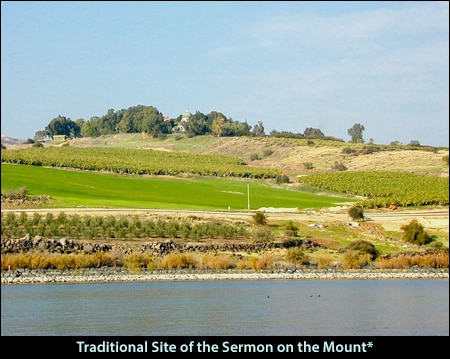
Purpose For The Selection
When morning came, Jesus called some of His disciples up onto the mountain. He did not ask all of them to meet with Him.
And He went up on the mountain and summoned those whom He Himself wanted, and they came to Him. Mark 3:13 (NASB)
Out of the great crowd of people, there was a smaller group of men who had proven to be faithful followers of Jesus. These are the men He called up to the top of the hill. Then both Mark and Luke tell us that there was an even smaller group of men whom Jesus chose to be His twelve disciples. Luke calls these men the twelve “apostles.”
And when day came, He called His disciples to Him and chose twelve of them, whom He also named as apostles . . . Luke 6:13 (NASB)
And only Mark tells us why Jesus appointed them.
And He appointed twelve, so that they would be with Him and that He could send them out to preach, and to have authority to cast out the demons. Mark 3:14-15 (NASB)
They were selected for three reasons. The first reason is that Jesus wanted a group of men who would be close to Him. That is, He wanted some friends. Jesus did not just choose friends who would always be loyal to Him. He did not pick friends who would not challenge Him. He picked friends who did not completely believe in Him yet. He picked them because He was investing Himself into them.
This is a great lesson for us. Friendships should not be just for our benefit. We should invest ourselves into the lives of our friends. Friendships should be opportunities to give our selves away. Here are some reminders from Proverbs:
A friend loves at all times . . . Proverbs. 17:17
A man of too many friends comes to ruin, but there is a friend who sticks closer than a brother. Proverbs 18:24 (NASB)
Faithful are the wounds of a friend, but deceitful are the kisses of an enemy. Proverbs 27:6 (NASB)
Oil and perfume make the heart glad, so a man’s counsel is sweet to his friend. Proverbs 27:9 (NASB)
Do not forsake your own friend or your father’s friend . . .” Proverbs 27:10 (NASB)
Friendship involves love, faithfulness, encouragement to live a righteous life, honesty, wise counsel, and loyalty. Jesus selected twelve men in whom He would be investing Himself. He also selected them because He needed friends. Everyone needs a few close friends.
Jesus also selected these men so that they would preach the good news about the kingdom. Some day they would fulfill the great commission given in Matthew 28:19-20. They would also do some practice preaching while He was here on earth. Jesus probably did some coaching and gave them some encouragement as He prepared them.
The third reason for selecting these men was to give them the authority to cast out demons and to heal (Acts 3:19). We will discover later that the apostles did not have divine power because there were some demons that they could not cast out (Mark 9:29). They would have to pray and ask for help to cast out some of them.
Jesus selected the apostles for friendship and to prepare them to carry on the ministry after He left this world. They would be His friends and fellow ministers. They would preach and help share the load of healing and casting out of demons. Together they would turn the world upside down.
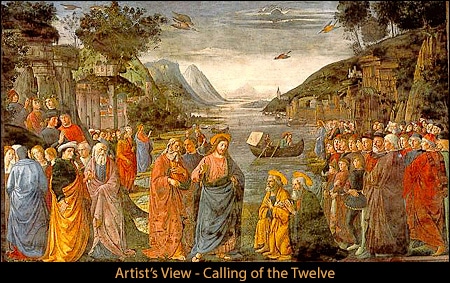
The Twelve
With the masses down below, and the team up on the hilltop, Jesus then selected twelve. Jesus probably did not just start announcing the names of the twelve apostles. Most likely He started by explaining His goal and purpose in selecting a small group of men who would be His apostles or “sent ones.” He might have answered some questions and spoken some kind words to the group before announcing the names. Then he finally named the twelve men. Some of the men were probably nervous and excited all at the same time. Some of them were probably hoping to be selected and were probably also afraid because Jesus was not just an ordinary man. They were not following Him because they believed He was like their neighbor next door.
The men whom He selected were as follows:
And He appointed the twelve: Simon (to whom He gave the name Peter), and James, the son of Zebedee, and John the brother of James (to them He gave the name Boanerges, which means, “Sons of Thunder”); and Andrew, and Philip, and Bartholomew, and Matthew, and Thomas, and James the son of Alphaeus, and Thaddaeus, and Simon the Zealot; and Judas Iscariot, who betrayed Him. Mark 3:16-19 (NASB)
The first four men in this group of disciples were Peter, Andrew, James, and John. They had already started following Jesus after John the Baptist announced to the crowd that Jesus was the “Lamb of God” (John 1:35-42). These men had followed Jesus into Galilee, then south to Jerusalem, and then north to Samaria. Then they left Jesus and returned to Capernaum. We do not know why they left, but they did. Sometime days later Jesus found them on the shore of the Sea of Galilee and called them to follow Him. He promised that if they would follow, He would make them fishers of men; the men did. Then they followed Him into Capernaum and spent a day with Jesus. From there Jesus traveled throughout Israel and the people flocked to Him from the Decapolis, Jerusalem, Syria, and from beyond the Jordan. Later in Luke 5:1-11 we discovered that the disciples had left Jesus again. Jesus found them and called them a second time. The first time they found Jesus they believed. Then He called them to follow, and finally He asked for everything. He wanted their total commitment.
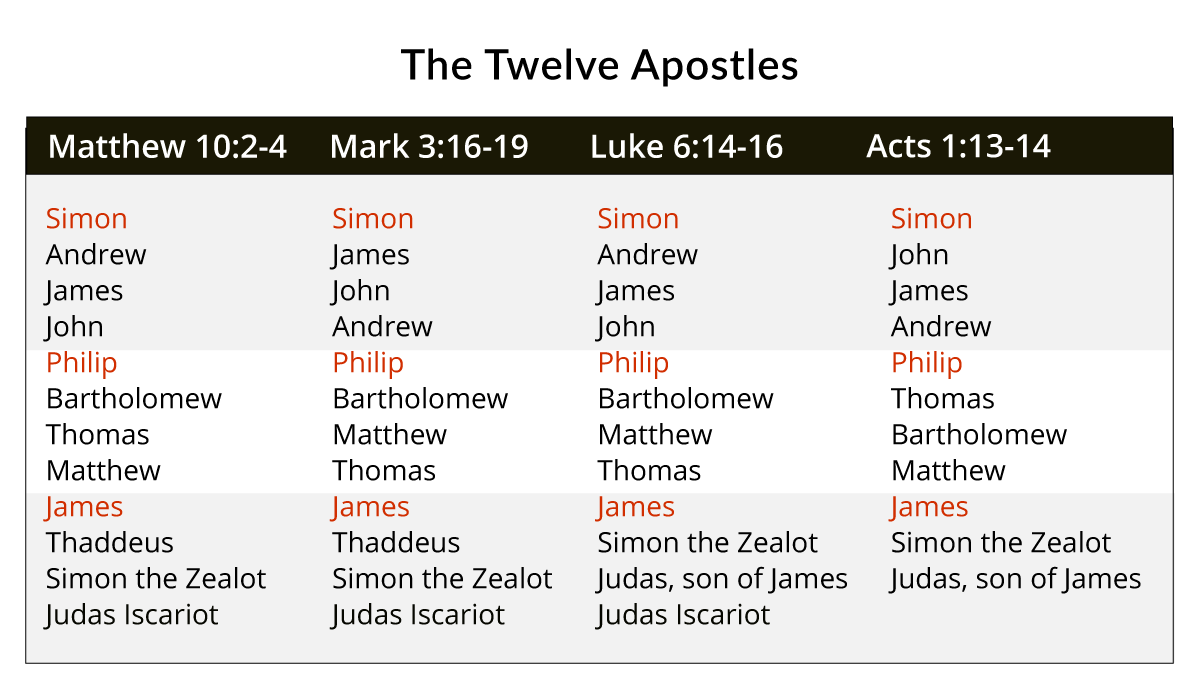
So we should not be surprised if these four men were the first ones whom Jesus appointed. We should also not be surprised if Jesus then appointed Philip and Nathanael ( also named Bartholomew) since He had met them just after He met Peter, Andrew, James, and John (John 1:43-51). After that the gospels say that Jesus had called Matthew in Matthew 9:9, and Matthew appears next in the list. It is interesting to note that all seven of these men are usually listed near the top in every list of the apostles in Matthew, Mark, Luke, and Acts.
If we compare the lists, we discover that Thaddeus was also called Judas, son of James. It was common for the disciples to have multiple names. For example, Simon was also called Peter (Mark 3:16; Luke 6:14). The apostles John and James were also called “sons of Thunder” (Mark 3:17). Thomas was also known as Didymus (John 20:24).
Judas, the one who will betray Jesus, appears to have been named last. In a humorous book titled The Cotton Patch Version of Luke and Acts, we read this about Judas and the other apostles,
At dawn he called up his students, and from them he selected twelve, who he designated “ambassadors.” They were: Simon (whom he also called Rock) and his brother Andy; Jim and Jack, and Phil and Barth, and Matt and Tom, and Jim Alphaeus, and Simon the Rebel, and Judas Jameson, and Judas Iscariot – who turned him in.”[1]
Judas was the one “who turned Him in.”
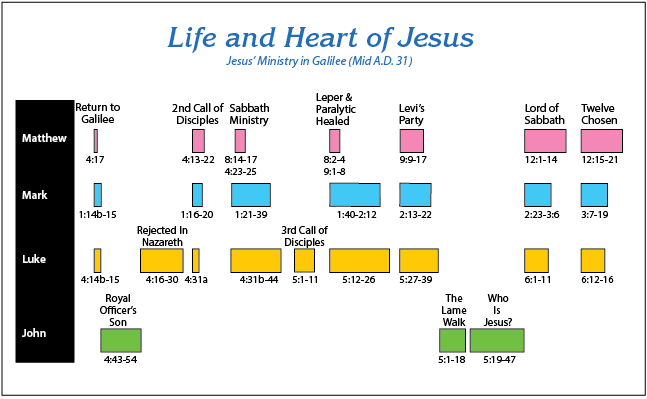
Selection Process
Jesus did not conduct a class on how to become an apostle before He selected them. Today, some churches conduct a class on being an elder or church leader. But Jesus did not do that. Instead He called, tested, and watched each one. He was evaluating their character and their faithfulness for a long time. Jesus had divine insight into the future spiritual character of each man. He knew the secrets of their hearts and minds. Unfortunately, we do not have that advantage, but God has given us some external criteria for looking inside a man and determining his spiritual condition and preparation for leadership in the church. They are given in 1 Timothy 3:1-7. Yet, some churches ignore these criteria because they do not have men who qualify. As a result, we should not be surprised at the condition of some churches.
The example of the first four apostles is an important pattern: they believed, they followed, and finally they were willing to leave everything to serve Jesus. We should look for the same in others who might be future leaders. They were not ready until their spiritual character was in order and they were willing to leave everything.
Conclusion
In the beginning, Jesus worked with these men, prepared them, selected them, and then gave them responsibility. But Jesus was not finished. He poured His life into them. These apostles had no idea about their future; but in years to come, they would turn the world upside down. Their names would become known worldwide and down through the ages. The Roman Catholic Church would call them saints. They became famous because they were great spiritual leaders – the hand chosen ones of God.
There is a plaque in my study that is primarily for a pastor but also describes anyone who wants to serve God. In fact, every Christian should seek to minister or shepherd others for God. The ministry is not just for pastors. It is for any follower of Jesus. The words on the plaque read as follows,
It is by no means easy for a young man to become a Shepherd, and he ought not be discouraged if he cannot become one in a day or a year. An orator he can become without difficulty. A reformer he can become at once. In criticism of politics and society he can do a flourishing business the first Sunday. But a shepherd he can become only slowly, and by patiently travelling the way of the cross. – Charles Jefferson, 1860-1937
It applies to every follower of Jesus because we are called to care for others and to minister our spiritual gifts. So what is your spiritual character and commitment to God?
Credit Line:
References:
1. Jordan, Clarence, The Cotton Patch Version of Luke and Acts, New Win Publishing, 1969., p. 30